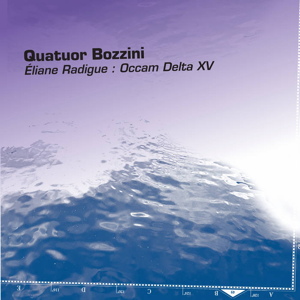
Éliane Radigue (b. 1932)
Occam Delta XV
Bozzini Quartet
rec. 2021, Pantheon, Paris, France
Reviewed as a digital download from a press preview
Collection QB CQB 2331 [73]
The prize for the greatest twentieth century composer nobody has ever heard of is, sadly, a hotly contested one and Eliane Radigue might have as strong a claim as anyone. Outside modernism fanatics and geeks of early electronic music, she hasn’t made much of an impact on the wider world of classical music. This is a great pity as, currently celebrating her 90th year, she has amassed a considerable body of work and is still going strong. Her approach, as exemplified by this latest release, is simultaneously technically extreme yet magnetically cumulative. Out of the most unpromising of materials she makes music that touches the deepest emotions and feeds the soul. Most of her compositions are very long – though this latest quartet is brief compared her monumental Trilogie de la Mort – and during their enormous spans very little happens and what does happen is often virtually imperceptible.
The changes that occur as often so minute as to make minimalism seem, well, maximal! The effect is more like witnessing a natural phenomenon like the movement of clouds across the sky or the motion of the sea than any more traditional form of music.
Up until 2001, Radigue’s music was exclusively electronic but since then she has written her now extensive series of Occam pieces for live musicians either playing singly or in small groups. Essentially the method has remained the same with drone like sounds being modified at the microtonal level over long time periods.
The other essential fact about Radigue’s music is her discovery of Buddhism in the 1970s. It might be helpful to see her works thereafter as not so much aids to meditation as meditations themselves. This would imply a great break in Radigue’s creative output into before and after finding Buddhism but it is more a case of refinement and focusing on tendencies that were already there. The music provides a point upon which to fix the attention. Inevitably over long timescales the attention does wander but such is the seemingly unchanging nature of Radigue’s music it is relatively easy to get back to that point of focus – if nothing else there isn’t anything else going on in the music!
There are some similarities in terms of the process with the music of Morton Feldman though stylistically they are very different. In both cases, long duration combined with an extreme reduction in terms of the eventfulness of the music, compel the attentive listener to notice smaller and smaller elements of the score. Tiny nuances come more prominently to the fore. With Radigue’s music, it is rather like paying attention to the subtle shifts in colour in Monet’s Waterlilies.
All of these things add up to music which is deeply calm in nature rather than something cacophonous. It does require a certain attitude in the listener but once succumbed to her music emerges as deeply spiritual and satisfying. There is nothing sensational or cheap about it and, particularly in a late work such as this quartet, it has a remarkable purity. The scope of its vision is nothing less than eternity.
Another peculiarity of these late Occam pieces is that they have never been written down, with the composer transmitting her intentions verbally to the performers. This introduces a high level of chance to any performance and the work grows out of an intimate creative relationship rather the composer issuing written instructions. Each piece is created anew with each performance. This present recording features two performances- or perhaps recreations might be a better term – of the same work. The two accounts are recognisably the same piece but also noticeably distinct.
Played with frankly awe-inducing levels of concentration and intensity and beautifully recorded, this is as good an introduction to the profound satisfactions to be found in Radigue’s work as I can think of. One of the great musical minds of our era is here to be discovered.
David McDade
Availability: Bandcamp

















